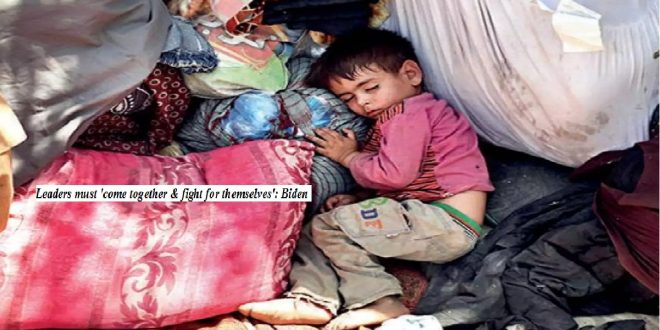11-08-2021
By SJA Jafri + Bureau Report + Agencies
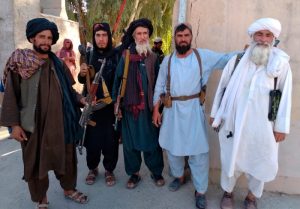 KABUL/ ISLAMABAD/ WASHINGTON: The Taliban has captured two more cities in Afghanistan, taking the number of provincial capitals the group has seized since Friday to eight.
KABUL/ ISLAMABAD/ WASHINGTON: The Taliban has captured two more cities in Afghanistan, taking the number of provincial capitals the group has seized since Friday to eight.
Farah city of the eponymous southwestern province and Pul-e-Khumri of the northern province of Baghlan both fell to the armed group on Tuesday. Local sources confirmed the capture of both provincial capitals to media.
“This afternoon the Taliban entered the city of Farah after briefly fighting with the security forces. They have captured the governor’s office and police headquarters,” Shahla Abubar, a member of Farah’s provincial council, told the AFP news agency on Tuesday.
The Taliban has captured the province’s central prison, according to parliamentarian Abdul Nasri Farahi.
Farah is now the second provincial city in the southwest of Afghanistan that the group has taken. On Friday, the Taliban captured neighboring Nimruz province.
The capture of Farah also provides another border crossing into Iran for the group.
Abubar said local security forces had retreated towards an army base outside the city.
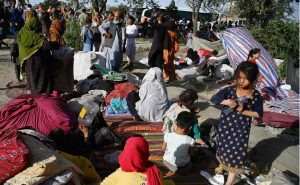 On Tuesday, the Taliban captured Pul-e-Khumri, capital of Baghlan province and about 200km (125 miles) north of Kabul, a member of parliament from the area and an army officer told AFP.
On Tuesday, the Taliban captured Pul-e-Khumri, capital of Baghlan province and about 200km (125 miles) north of Kabul, a member of parliament from the area and an army officer told AFP.
“After about two hours of fighting the security forces were overpowered and retreated,” said Mamoor Ahmadzai, the lawmaker.
The capture of Pul-e-Khumri gave the Taliban a trifecta of bordering Northern provinces.
Earlier this week, the Taliban captured Kunduz and Takhar. This now gives them control of almost the entire 378-km road from Kabul to the northeastern province of Badakhshan. That road is a major transit hub for passenger and commercial vehicles and the transport of illicit goods, including narcotics.
Rob McBride, reporting from the Afghan capital Kabul, said the fall of Pul-e-Khumri was a “significant development”.
“Significantly, this brings the fighting a lot closer to Kabul itself, and that is a concern for the government.”
The Taliban have captured eight out of 34 provincial capitals in the country in less than a week.
A senior EU official told the Reuters news agency on Tuesday that Taliban forces now control 65 percent of Afghan territory, are threatening to take 11 provincial capitals, and are trying to deprive Kabul of its traditional support from national forces in the north.
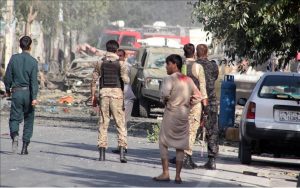 The group had already gained vast parts of rural Afghanistan since launching a series of offensives in May to coincide with the start of the final withdrawal of foreign troops.
The group had already gained vast parts of rural Afghanistan since launching a series of offensives in May to coincide with the start of the final withdrawal of foreign troops.
In a major push to repel advancing Taliban from urban centres, the Afghan forces claimed they killed 361 Taliban fighters in air and ground offensives in the past 24 hours.
The defence ministry said the operations were conducted in the Nangarhar, Kunar, Logar, Paktia, Paktika, Maidan Wardak, Kandahar, Sar-e-Pul, Helmand, Kunduz, and Baghlan provinces.
McBride said the government was now focusing on defending larger, more strategically important provincial capitals and sending its resources there.
“It does have plans to retake some of these lesser provinces, but given the pace of the advance by the Taliban, it remains to be seen if it will put those counterattacks into effect and if they will be successful,” he said.
Widespread conflict
The Taliban have now overrun six provincial capitals in the north. They have also taken Zaranj, the capital of Nimruz province, in the southwest.
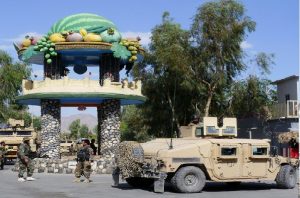 On Tuesday, the Taliban claimed they were closing in on Mazar-i-Sharif – the region’s biggest city and a linchpin for the government’s control of the north – after capturing Sheberghan to its west, and Kunduz city and Taluqan to its east.
On Tuesday, the Taliban claimed they were closing in on Mazar-i-Sharif – the region’s biggest city and a linchpin for the government’s control of the north – after capturing Sheberghan to its west, and Kunduz city and Taluqan to its east.
Fawad Aman, spokesman for the Ministry of Defense, said the Afghan forces had the upper hand there but residents speaking to media said the city’s Maulana Jalaluddin Balkhi International Airport is being overrun with hundreds of people desperate to flee.
India’s government shut its consulate in Mazar-i-Sharif on Tuesday, and urged its diplomats and Indian citizens to take a special flight home.
India, which has invested millions of dollars in development projects across Afghanistan, has now closed all its consulates, leaving only the embassy in Kabul operational, a government official said.
Violence against Afghan civilians by Taliban fighters “could amount to war crimes and crimes against humanity” United Nations High Commissioner for Human Rights Michelle Bachelet said on Tuesday, before urging a return to peace negotiations in Doha.
McBride said that, according to a report by the EU, some 400,000 people have been internally displaced in Afghanistan in recent months.
“Quite a few of them are coming here to the relative safety of the capital, but they are putting a large strain on resources here,” McBride said.
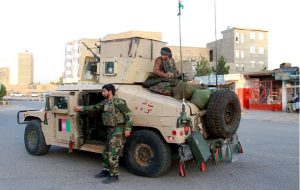 “The Red Cross is saying that in its clinics in the past 10 days, they have been treating more than 4,000 people, civilians caught up in this conflict.”
“The Red Cross is saying that in its clinics in the past 10 days, they have been treating more than 4,000 people, civilians caught up in this conflict.”
The new wave of deadly clashes started last month when, after overrunning nearly 200 rural districts, the Taliban began assaults on major cities as they marched on Herat city, Kandahar city, Taluqan, and Lashkar Gah, causing panic and worry among millions of civilians.
The United States – due to complete a troop withdrawal at the end of the month and end its longest war – has all but left the battlefield.
White House press secretary Jen Psaki said the Biden administration still felt that only negotiations could bring lasting peace and stability to Afghanistan.
“Ultimately, our view is that the Afghan national security defence forces have the equipment, numbers and training to fight back, which will strengthen their position at the negotiating table,” Psaki told a regular press briefing.
Washington’s special envoy Zalmay Khalilzad is now in Qatar to try and convince the Taliban to accept a ceasefire.
Omar Samad, non-resident fellow at the Atlantic Council and former spokesman for Afghanistan’s Ministry of Foreign Affairs, told media that the Afghan delegation from Kabul and the Taliban delegation met separately with representatives of key stakeholder countries on Tuesday.
 “It is expected that this will last two more days,” Samad said, adding that “the resolution has to come from the political side.”
“It is expected that this will last two more days,” Samad said, adding that “the resolution has to come from the political side.”
“We’ve lost a lot of time; I think that many opportunities were wasted over the last three years,” Samad said.
“I think that there’s enough blame to be shared by all sides for not really pushing sincerely for a political resolution of the problem when it was possible. Now, it’s more difficult.”
US President Joe Biden urged Afghanistan’s leaders Tuesday to unite and “fight for their nation” against the Taliban insurgents and said he did not regret deciding to withdraw US troops from the country.
“Afghan leaders have to come together,” Biden told reporters. “They’ve got to fight for themselves.”
Biden said the United States would continue to support the government in Kabul, but added that “I do not regret my decision” to pull US troops out by August 31 after two decades of war.
 Pressmediaofindia
Pressmediaofindia
